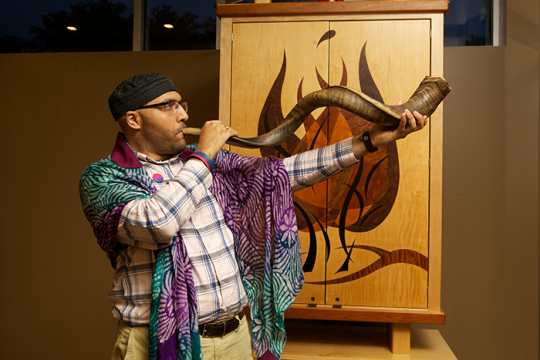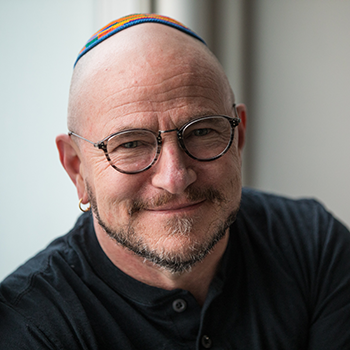
The opening chapters of Genesis introduce and establish one of the most enduring elements of Jewish religion, spirituality, and culture: the power of food.
The sixth day of creation includes the appearance of humankind along with these instructions for their care and feeding in Genesis 1:29: "God said, 'See, I give you every seed-bearing plant that is upon all the earth, and every tree that has seed-bearing fruit; those will be for you to eat.'"
Shortly thereafter, however, the diet is amended when God takes a certain delicacy-the fruit on the Tree of Knowledge of Good and Evil-off the menu in Genesis 2:16-17:
And God commanded humanity, saying, 'Of every tree of the garden you may surely eat; but from the Tree of Knowledge of Good and Evil, you are not to eat from it; because as soon as you eat from it, you shall surely die.'
However, Genesis 3:6 contains a surprising plot twist: our foremother Eve discovers the forbidden fruit and famously can't resist.
And the woman saw that the tree was good for eating and a delight to the eyes, and to understand the tree's delights, she took from its fruit and ate. She also gave some to her husband, and he ate.
Eve and Adam survive their forbidden fruit adventure, but Eve's gastronomic moxie alters the course of human history forever. That forbidden taste may have invited death, shame, and a slew of other uncomfortable repercussions into the world...but for a moment, it sure was delicious!
Jews are often called "The People of The Book" (a sobriquet originally found in the Quran), but given Eve's foodie instincts, I would argue that "The People of the Cookbook" is more apt. Eve was hardly alone, the Torah is filled with stories about passionate food preparation and consumption. It could be said that the origins of all cooking shows may be traced there!
Shortly after the forbidden fruit episode, Eve's sons get a spinoff. Their story is essentially a cooking competition, which might have been called "Chopped with Cain and Abel." There, we find Cain, an organic vegetable farmer, competing with his rancher brother, Abel, to make a meal using their home-grown ingredients. God judges the entries, and (spoiler alert) Abel the goatherd takes the prize.
That win sets off the first jealousy-fueled celebrity homicide. In this case, the farmer butchers the butcher. The murder is scandalous and sordid…and just like that, Cain and the rest of the season are cancelled.
More food-centered stories follow. A few chapters later, in Genesis 8:20-21, Noah disembarks from the Ark and begins humanity's second season by firing up the barbeque and smoking some chicken. Genesis 9:20-21 tells us that he then plants the world's first boutique vineyard and winery.
In Genesis 18:1-10, Abraham and Sarah serve angelic guests a meal that mixes meat and milk (a combo that, a few centuries later, will be forbidden). However, at the time, the meal wins the approval of the guests and Abraham and Sarah's culinary generosity is rewarded with the promise of a son.
In Genesis 25:30-34, Abraham and Sarah's grandsons take their chapter in a different direction. Esau sells Jacob his birthright for a slab of naan and a bowl of red lentil soup. A few chapters later, in Genesis 27:1-27, Jacob, with his mother Rebecca's help, cooks up a copycat version of Esau's signature brisket, tricking their father into blessing him instead of his brother.
Food continues to play a role in the spiritual adventures of the Israelites in the Torah, eventually evolving into the central component of worship. From the sacrifices in the Tabernacle through the First and Second Temples in Jerusalem, the focus stays on food. In the Temple, the kohanim perfected the arts of bread making, snout to tail butchering, holy barbequing, sacred olive oil production, salt refinement, wine making, elaborate place settings, and more.
The Temple in Jerusalem launched the ultimate cooking show: an ancient version of Master Chef for enlightenment, soul attunement, expiation of sins, expression of gratitude, and affirmation. Through eating and drinking together, we discovered that community can bring peace. Is it any wonder that, by the time we end up in the Diaspora, Jewish food is firmly entrenched as among the most legitimate forms of cultural/spiritual/religious expression?
Food is still an innate part of the Jewish experience: whether we're eating matzah on Passover, blintzes on Shavuot, latkes during Hanukkah, or even showing contrition by fasting on Yom Kippur, food (or the lack thereof) is often how we express our faith. Even Jews who may not eat any of the aforementioned foods will still go to the mat over what may be considered "the best bagel."
In my 30 years of Jewish communal service, I have yet to lead a Jewish life cycle ritual that didn't also feature a robust feast. We literally eat our Torah: through bitter maror, sweet apples and honey, stripped down matzah, and enriched challah, Jews ingest and embody our stories, symbols, and spirituality through our continuing culinary journey.
May we embrace the bitter with the sweet, the salty with the tangy, the fiery with the refreshing. Let us embrace this culture of gustatory Oneness. We are what we eat, friends, we are what we eat. So let us taste it all. B'Tayavon!
Related Posts

Elul is Calling


